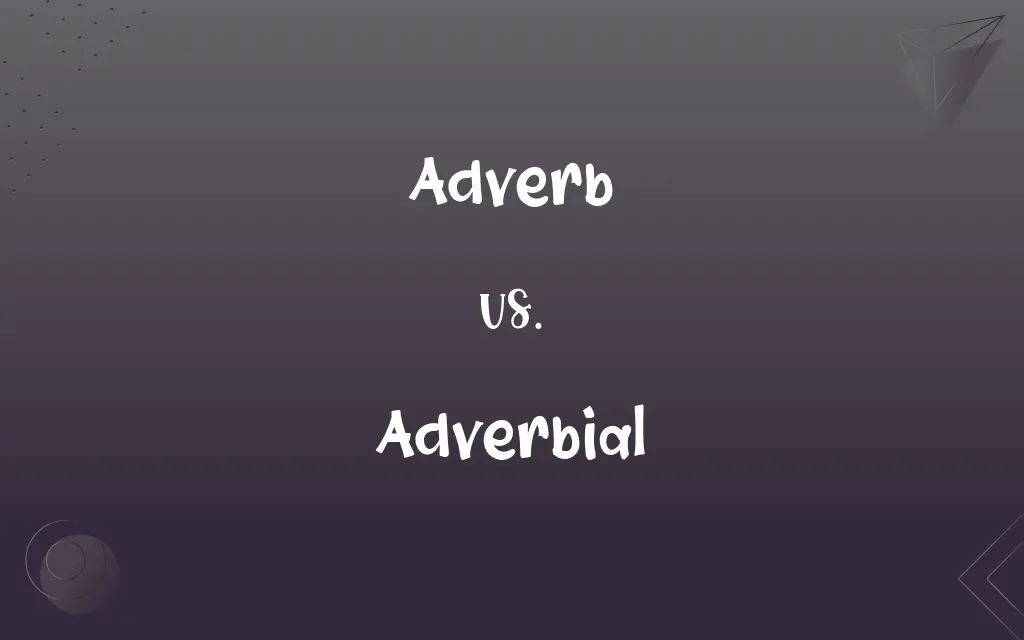Adverb vs. Adverbial: What's the Difference?
Edited by Aimie Carlson || By Janet White || Published on November 28, 2023
An adverb is a word modifying a verb, adjective, or another adverb, while an adverbial is a word, phrase, or clause functioning as an adverb.

Key Differences
An adverb is a specific part of speech that can modify verbs, adjectives, or other adverbs by answering questions like "how," "where," "when," and "to what extent." On the other hand, adverbial is a more general term that describes any word, phrase, or clause that functions like an adverb.
Adverbs often end in "-ly," though this is not a strict rule. Examples include "quickly," "happily," and "rarely." Conversely, an adverbial can be a single word, a phrase like "in the morning," or even an entire clause, all serving the purpose of giving more information about the action.
In terms of classification, while adverbs are primarily standalone words, adverbials can be adverbial phrases or clauses, broadening the range of linguistic structures that can function in an adverbial capacity.
An adverb typically provides insight into the manner, frequency, degree, or location of the action. Adverbials, while serving a similar function, offer this insight through more varied linguistic constructions, often providing a richer context or nuance to the sentence.
In essence, while adverbs are specific words with the task of modification, adverbials are a broader category, encompassing any element in a sentence functioning as an adverb.
ADVERTISEMENT
Comparison Chart
Basic Definition
Word modifying a verb, adjective, or adverb
Word, phrase, or clause functioning as an adverb
Linguistic Form
Typically standalone words
Can be single words, phrases, or clauses
Common Endings
Often ends in "-ly"
Varied, depending on the construction
Examples
Quickly, softly, often
In the morning, with a smile, because she wanted to
Flexibility in Sentence
More rigid position
Offers more flexibility in positioning within a sentence
ADVERTISEMENT
Adverb and Adverbial Definitions
Adverb
A word that modifies an adjective.
She is very tall.
Adverbial
A word, phrase, or clause functioning as an adverb.
He left in a hurry.
Adverb
A word that indicates frequency.
I always drink coffee in the morning.
Adverbial
A construction providing reason or cause.
He's sad because she left.
Adverb
A word that modifies another adverb.
He drives quite slowly.
Adverbial
A linguistic element providing context to the action.
She visits on weekends.
Adverb
A word that modifies a verb.
He ran quickly.
Adverbial
A term describing manner or degree.
She answered with enthusiasm.
Adverb
The part of speech that modifies a verb, an adjective, another adverb, or an entire clause or sentence.
Adverbial
A phrase indicating location or direction.
They live near the park.
Adverb
Any of the words belonging to this part of speech, such as so, very, and rapidly.
Adverbial
Of, relating to, or being an adverb.
Adverb
(grammar) A word that modifies a verb, adjective, other adverbs, or various other types of words, phrases, or clauses.
Adverbial
An adverbial element or phrase.
Adverb
(programming) In the Raku programming language, a named parameter that modifies the behavior of a routine.
Adverbial
(grammar) Of or relating to an adverb.
Adverb
(rare) To make into or become an adverb.
Adverbial
(grammar) An adverbial word or phrase.
Adverb
A word used to modify the sense of a verb, participle, adjective, or other adverb, and usually placed near it; as, he writes well; paper extremely white.
Adverbial
Of or pertaining to an adverb; of the nature of an adverb; as, an adverbial phrase or form.
Adverb
The word class that qualifies verbs or clauses
Adverbial
A word or group of words function as an adverb
Adverb
A word that modifies something other than a noun
Adverbial
Of or relating to or functioning as an adverb;
Adverbial syntax
Adverb
A word that describes the manner of an action.
She sings beautifully.
FAQs
Can a phrase be adverbial?
Yes, phrases like "in the morning" or "with a smile" function as adverbials.
What is an adverb?
An adverb is a word that modifies a verb, adjective, or another adverb.
How do adverbs differ from adjectives?
Adverbs modify verbs, adjectives, or other adverbs, while adjectives modify nouns.
Can an entire clause function as an adverbial?
Yes, adverbial clauses can provide reasons, conditions, time, and more.
How can I identify an adverb in a sentence?
Look for words that answer how, when, where, or to what extent about the action.
Do all adverbs end in "-ly"?
No, while many adverbs do, there are plenty, like "well" or "often," that don't.
Is "inside" an adverb or adverbial?
"Inside" can be an adverb, as in "Come inside." When used as such, it's also an adverbial.
What's an example of an adverbial clause?
"Because she was tired" is an adverbial clause explaining a reason.
What does adverbial mean?
Adverbial refers to any word, phrase, or clause that functions as an adverb.
Are adverbials essential in sentences?
No, they add detail but sentences can be grammatically correct without them.
Is every adverb also an adverbial?
Yes, since every adverb functions in the manner of an adverb, it is also an adverbial.
Are all adverbials also adverbs?
No, while all adverbs are adverbials, not all adverbials are standalone adverbs.
Can adjectives be turned into adverbs?
Often by adding "-ly" to an adjective, like "quick" to "quickly," it can become an adverb.
Is "very" an adverb?
Yes, "very" is an adverb that modifies adjectives or other adverbs, indicating degree.
How do I recognize an adverbial phrase?
Look for groups of words that give more information about the verb without a subject and verb of their own.
Can adverbials be moved within a sentence?
Often, yes. Adverbials, especially phrases and clauses, can be positioned differently for emphasis or style.
What's the purpose of an adverbial?
Adverbials provide additional information or context about the action of the verb.
Can adverbs stand alone?
Yes, adverbs are standalone words, but they relate to other parts of the sentence.
What role do adverbs play in language?
Adverbs add precision, clarity, and detail to actions, helping convey nuances.
Why use adverbials in writing?
Adverbials enrich writing by adding context, details, and depth to the narrative.
About Author
Written by
Janet WhiteJanet White has been an esteemed writer and blogger for Difference Wiki. Holding a Master's degree in Science and Medical Journalism from the prestigious Boston University, she has consistently demonstrated her expertise and passion for her field. When she's not immersed in her work, Janet relishes her time exercising, delving into a good book, and cherishing moments with friends and family.
Edited by
Aimie CarlsonAimie Carlson, holding a master's degree in English literature, is a fervent English language enthusiast. She lends her writing talents to Difference Wiki, a prominent website that specializes in comparisons, offering readers insightful analyses that both captivate and inform.







































































